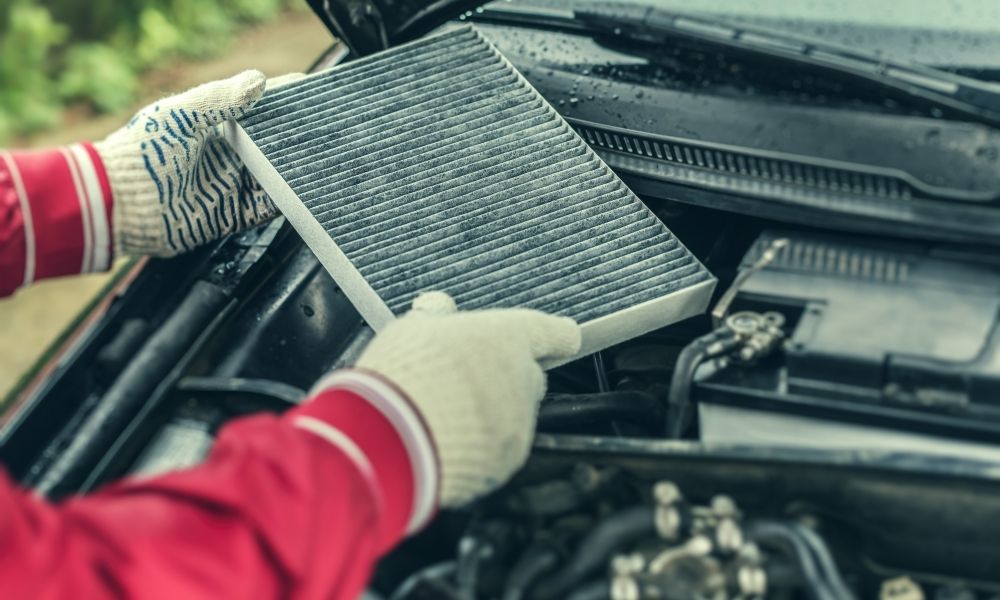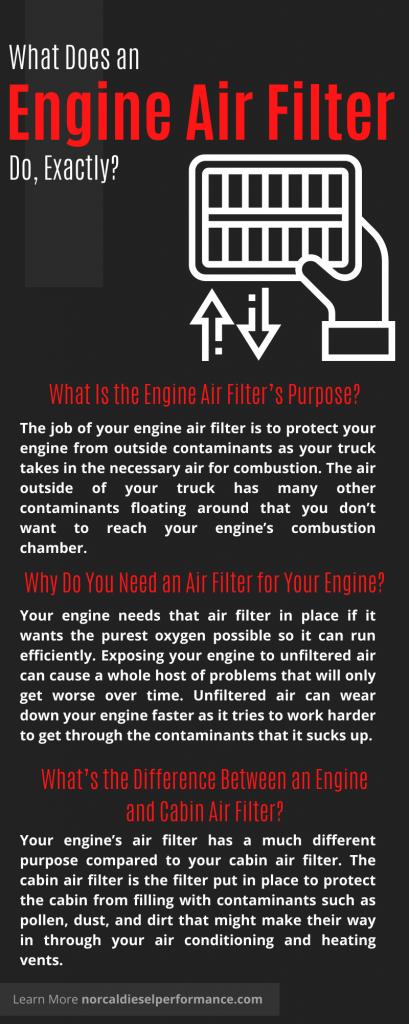


When your goal is to get the highest level of performance out of your diesel truck, you can’t afford to overlook anything that might affect how well your engine runs. While some people will rush to replace the more expensive parts of their engine if they feel there is a problem, sometimes, the issue is much simpler than you might think. Your engine’s air filter, for example, may seem like a very small part of the greater whole, but it has a profound effect on performance and even gas mileage.
What does an engine air filter do, exactly? The answer to that question seems like a no-brainer, but we can start to see how important it really is once we dive a little deeper into how your truck’s engine works. Here, we’ll go over what you need to know about your truck’s engine air filter, what exactly it does, and how to know when there might be a problem with it. This knowledge will help you better understand what could happen to your truck’s engine that might cause reductions in performance.
So, what exactly does an engine air filter do? First, you should know how important it is for your engine to receive clean and highly oxygenated air to start the combustion process needed for it to run correctly. If your engine doesn’t receive the oxygen it needs or if it receives contaminants other than oxygen, the combustion process won’t allow your engine to run at maximum efficiency.
The job of your engine air filter is to protect your engine from outside contaminants as your truck takes in the necessary air for combustion. The air outside of your truck has many other contaminants floating around that you don’t want to reach your engine’s combustion chamber. An engine air filter that works properly will block contaminants such as dust and other debris from getting into your engine, supplying it with only clean air that it can use to work correctly.
Once you know the purpose of your engine’s air filter, you start to see why it’s so important for it to be there and be as clean as possible. Your engine needs that air filter in place if it wants the purest oxygen possible so it can run efficiently. Exposing your engine to unfiltered air can cause a whole host of problems that will only get worse over time. Unfiltered air can wear down your engine faster as it tries to work harder to get through the contaminants that it sucks up.
Small amounts of dust won’t do a ton of damage, but it’s important to remember just how much air your engine goes through every time you turn it on for a drive. Vehicle engines, especially in larger vehicles such as pickup trucks, take in a massive amount of air each time you drive. Despite the large quantities of air your engine takes, even small amounts of debris making their way into your engine can quickly get out of control.
You’re likely aware that your engine air filter isn’t the only filter that your truck has inside of it. For some beginners, the term “air filter” can be taken too literally. Your engine’s air filter has a much different purpose compared to your cabin air filter. The cabin air filter is the filter put in place to protect the cabin from filling with contaminants such as pollen, dust, and dirt that might make their way in through your air conditioning and heating vents. This cabin air filter is a completely separate filter from your engine air filter. Your engine’s air filter only filters the air that will eventually make its way into your engine’s combustion chamber. Replacing both of these filters regularly is crucial for the health of your truck as well as your own physical health. You don’t want to continually breathe in a bunch of dust and debris from the road.
Having a clogged air filter can be a serious problem, and it may manifest in several ways that you’ll be able to notice quite quickly. The easiest way to tell if you should replace your engine air filter is to look at it yourself. There’s nothing complicated about checking your own filter; if it looks noticeably dirty to you, it might help your engine to get a replacement.
There are other signs that you should keep an eye out for when it comes to your engine air filter. If you find that your truck isn’t accelerating as quickly as it used to, it could mean that your engine isn’t getting the same quality of air as it used to. You may even notice that your truck starts to idle differently as well if your filter needs a replacement. You should also keep a close eye on your exhaust. When your filter isn’t doing its job right, more contaminants will reach your engine’s combustion chamber and burn along with your fuel. This can sometimes create more smoke from your exhaust that is noticeably closer to black and might even leave a sooty residue behind.
The best place to check how often you need to replace your engine air filter is in your truck’s user manual. As a good rule of thumb, you should never go over 12 months without replacing your engine air filter. You may need to replace your truck’s engine air filter more frequently if you drive very often or for very long distances. Your environment is a factor as well. Frequently driving your truck in a particularly sandy or dusty area, such as a construction site, for example, might wear out your filter faster than normal.
If you’re looking to get the best performance out of your truck, your engine air filter is only one piece of the puzzle. You can really up your game by enhancing your engine with a 6.7 Powerstroke air intake system from Norcal Diesel Performance. Don’t settle for mediocre performance when it’s so easy to get the best with just a simple upgrade.

You must login to post comments.